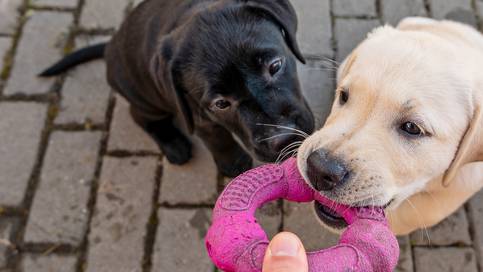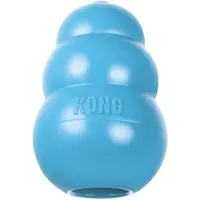How to stop a puppy chewing
Here’s how to stop a puppy chewing on things they shouldn't.

If you’ve recently welcomed a new bundle of fluff into your life, then you’re probably wondering how to stop a puppy chewing. It’s totally normal for your fur friend to gnaw on things at a young age, and there are lots of reasons why they might be doing it, from relieving teething pain to exploring their surroundings.
As innocent as this behavior is, we know how frustrating it can feel — especially if you (or your favorite piece of furniture) are on the receiving end! That’s why things like the best puppy teething toys can come in handy, giving them something safe to dig their teeth into.
Puppy teething won’t last forever, but to help you get through this challenging period, we've shared our top tips to stop them chewing. Dr. Hannah Godfrey has also revealed the age at which they’ll finally stop.
Why do puppies chew?
There are several reasons why your puppy may be chewing on things, some more benign than others. As mentioned above, puppies usually chew while their adult teeth are growing in as a way to alleviate pain. That kind of chewing can usually be abated with the best puppy toys.
If you believe your puppy is chewing for reasons aside from normal teething behavior, you should consult your vet. Here are a few reasons why your puppy might be excessively chewing.
1. Separation Anxiety
According to the ASPCA, dogs may chew to relieve stress from separation anxiety. These dogs will likely only chew when they're alone, or will chew much more intensely alone than when there are humans around. Dogs who are chewing because of separation anxiety will likely show other signs of it, like restlessness, pacing, urinating on the floor, and more.
2. Early weaning
Some puppies and dogs suckle or chew on fabrics, which experts suggest is a behavior resulting from having been weaned too early from their mother (usually before eight week sold). If a puppy is frequently sucking or chewing on fabric and you can't get them to stop, they may be exhibiting a compulsive behavior problem. ASPCA has ways to find professional behavior help that will help alleviate this, as it's something that should be left to the experts.
Get the best advice, tips and top tech for your beloved Pets
3. Hunger
Make sure you are feeding your puppy enough to ensure they aren't hungry and chewing on things to satiate that need. Consult your vet for how to feed your puppy an appropriate diet and ensure you buy the best puppy food for your dogs needs.
How to stop a puppy chewing
Here are some ways to stop a puppy chewing:
1. Find the cause
Consult the list above to determine what may be causing your puppy to chew. Is it just a normal teething behavior? A sign of separation anxiety? A side-effect of early weaning? If you're still not sure, reach out to your vet to rule out any health issues.
There are some ways of dealing with separation anxiety in dogs, but you may want to consult a vet and/or a behaviorist.

2. Give puppies cheap chew-safe options you have at home
If your puppy is just doing some normal chewing, there are ways to ensure they're chewing safely. When puppy chewing is at its most intense (usually before they reach six months), there are homemade puppy teething toys you can create from things around the home. Ice cubes and frozen washcloths are great options that will soothe while they chew, and you can redirect from chewing something they shouldn't by handing them an ice cube or washcloth.
3. Give your puppy plenty of bones/chews
Ice and washcloths are great, but you should also invest in bones and the best dog chew toys. You can also use the best longest lasting dog chews, but you should make sure they are puppy-safe before handing them out. Offering them edible things to chew will satisfy the chewing cravings as well as their hunger, but make sure you supervise when they're chewing.
Some chews can break off into smaller pieces that can pose a choking hazard. Be aware of the differences between rawhide vs. beefhide chews and never give animal bones leftover from meals. Look for dog-safe edible and inedible bones at your local pet store, and consider other chews like dog-safe ropes and Kong toys.
You can use toys as a way of taking their attention away from something they shouldn't be chewing. Hand them a toy as they're gnawing away at something they shouldn't, and be prepared to reward them with a treat if they turn their attention to the chewable object.
Kong Natural Teething Rubber Puppy Toy
We voted this as the best puppy toy overall, thanks to the durable design and how mentally stimulating it is to play with. Fill it up with your dog’s favorite treats and they’ll have loads of fun sniffing and biting them out. Our tester Sophie said it was great for tiring out her excitable pup and that it’s super easy to clean in the dishwasher.

4. Spray a bitter flavor on chewed items
The trick is to make the items your puppy is chewing unpleasant to them. You can coat furniture or other items with a dog-safe taste deterrent like Bitter Apple to make them not-so-tasty to your pup. Your dog may still persist and chew through the bad taste, so make sure you supervise them the first time you use it. You'll also need to reapply this deterrent in order for it to keep working.
5. Puppy-proof your home
Your puppy will likely still chew something they're not supposed to, so it's important that you puppy-proof (and dog-proof) your home to avoid them chewing anything dangerous or ruining anything that's expensive. We have a brilliant guide on how to puppy proof your home and garden if you want some expert tips.
Part of puppy-proofing your home is simple: take care of your own belongings. Put things away that you would not want in your dog's mouth like shoes, clothes, trash, books, and more. Get a tamper-proof garbage pail and put away items that may intrigue them, or block access to rooms that have objects in them that look especially chewable to your pup.
You might also want to install one of the best pet cameras to keep an eye on them.
6. Be patient
Puppies chew, it's what they do, so make sure you set realistic expectations and goals. It's very rare to find a dog owner whose dog didn't chew something they weren't supposed to, so try not to get discouraged if there's an incident. Remember, too, that yelling or otherwise punishing your puppy will not work - use positive reinforcement instead.
Well, there you have it. That's how to stop a puppy chewing!
To find out how long puppy teething lasts and learn more teething puppy tips, check out these experts' guide. We’ve also got expert advice on how to stop your dog chewing on the carpet.

Hannah graduated from the Royal Veterinary College in 2011 and began work straight away at a busy mixed practice. Initially, she treated all species but focused on small animals from 2014. She has a passion for soft tissue surgery, ultrasound, and canine and feline dentistry, having completed additional training in these areas.
She then began working at a smaller, independent practice close to home, in order to devote more time to her other love – writing comedy fiction. In February 2023, she moved from permanent clinical vet work to become an Editor for a global medical communications company. She hasn't given up clinical work altogether, though, and still does regular locum shifts at her local vet practices.
- Dr. Hannah Godfrey BVetMed MRCVSVet
- Megan MilsteadStaff Writer

